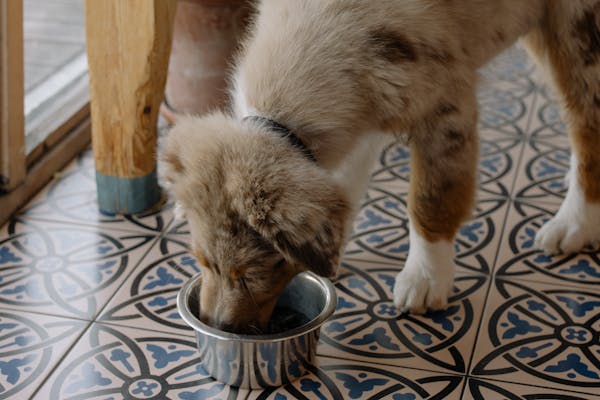
How much food to feed a dog Feeding your dog the right amount of food is crucial for their health and well-being. Overfeeding or underfeeding can lead to a variety of health issues, from obesity to malnutrition. But how do you determine the correct amount of food for your furry friend? This guide will help you understand the factors to consider and provide some practical tips for ensuring your dog gets the right amount of nutrition.
Factors Influencing How Much to Feed Your Dog
- Size and Breed
- Small Breeds: These dogs have higher metabolisms and often need more calories per pound of body weight than larger breeds.
- Large Breeds: Larger dogs need more food overall, but their metabolism is slower compared to smaller dogs.
- Breed-Specific Needs: Some breeds have unique dietary requirements. For example, working breeds like Border Collies may need more protein to support their energy levels.
- Age
- Puppies: Growing puppies need more calories than adult dogs. They often require more frequent feedings throughout the day.
- Adults: Adult dogs need a balanced diet that maintains their weight and health.
- Seniors: Older dogs may require fewer calories but more fiber and specific nutrients to support aging joints and organs.
- Activity Level
- Active Dogs: Dogs that get a lot of exercise will need more calories to sustain their energy levels.
- Less Active Dogs: Dogs with a sedentary lifestyle will need fewer calories to avoid weight gain.
- Health Condition
- Dogs with certain health conditions, such as diabetes, thyroid issues, or digestive problems, may require special diets.
- Always consult with your veterinarian if your dog has health issues that could affect their dietary needs.
Determining the Right Amount of Food
Reading Dog Food Labels
Dog food packages often provide feeding guidelines based on weight. How much food to feed a dog These are useful starting points but should be adjusted based on your dog’s individual needs. Here’s how to interpret these labels:
- Daily Recommendations: Most labels provide a recommended amount based on your dog’s weight.
- Quality of Ingredients: Higher-quality foods with better ingredients may require smaller portions because they provide more nutrients per serving.
Calculating Caloric Needs
You can calculate your dog’s daily caloric needs using their Resting Energy Requirement (RER):
𝑅𝐸𝑅(𝑘𝑐𝑎𝑙/𝑑𝑎𝑦)=70×(body weight in kg)0.75RER(kcal/day)=70×(body weight in kg)0.75
Once you have the RER, you can adjust it based on your dog’s activity level:
- Inactive/Neutered Adult Dogs: RER x 1.6
- Active/Working Dogs: RER x 2-3
- Puppies: RER x 2-3 (depending on age and growth rate)
Monitoring and Adjusting
- Regular Weigh-Ins: Weigh your dog regularly to ensure they are maintaining a healthy weight.
- Body Condition Score: Use a body condition score chart to assess if your dog is too thin, overweight, or just right. Your veterinarian can help you with this.
- Adjust Accordingly: If your dog is gaining or losing weight, adjust their food intake by about 10% at a time and monitor the changes.
Practical Tips for Feeding Your Dog
- Consistent Feeding Schedule: Feed your dog at the same times each day to help regulate their metabolism and digestion.
- Measure Portions: Use a measuring cup to ensure you are feeding the right amount.
- Avoid Table Scraps: Human food can be unhealthy and lead to weight gain or nutritional imbalances.
- Healthy Treats: Limit treats to 10% of your dog’s daily caloric intake and opt for healthy options like carrots or specially formulated dog treats.
When to Consult Your Veterinarian
Always consult your veterinarian when making significant changes to your dog’s diet or if you have concerns about their health. They can provide tailored advice based on your dog’s specific needs and conditions.
Conclusion
Feeding your dog the right amount of food is essential for their health and happiness. By considering factors like size, age, activity level, and health, and by following the tips provided, you can ensure your dog gets the nutrition they need to thrive. Remember, a healthy dog is a happy dog!
